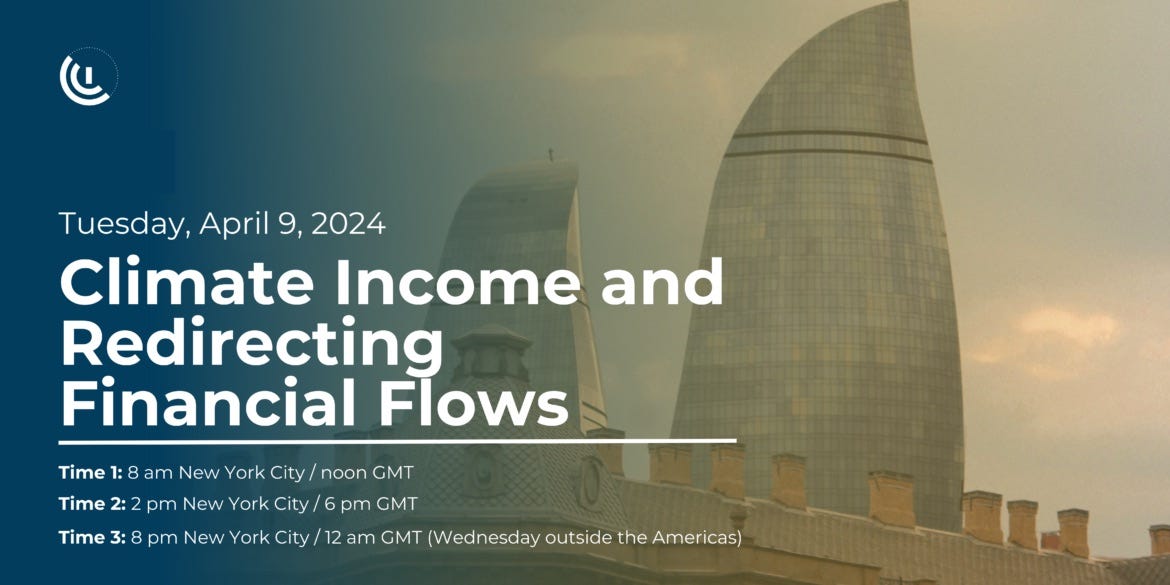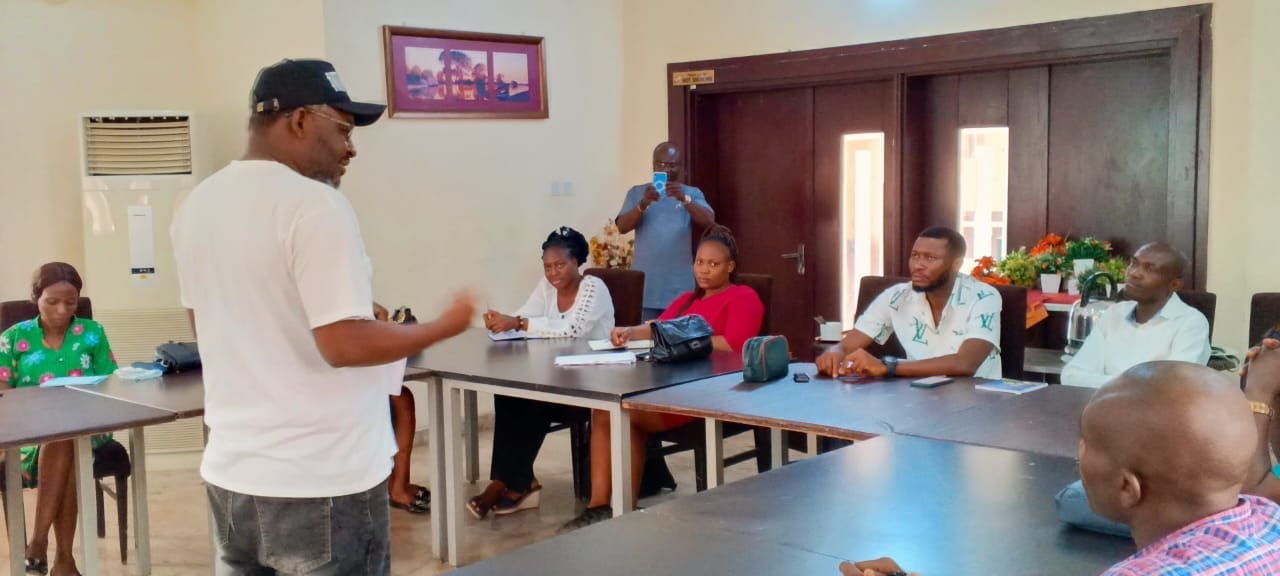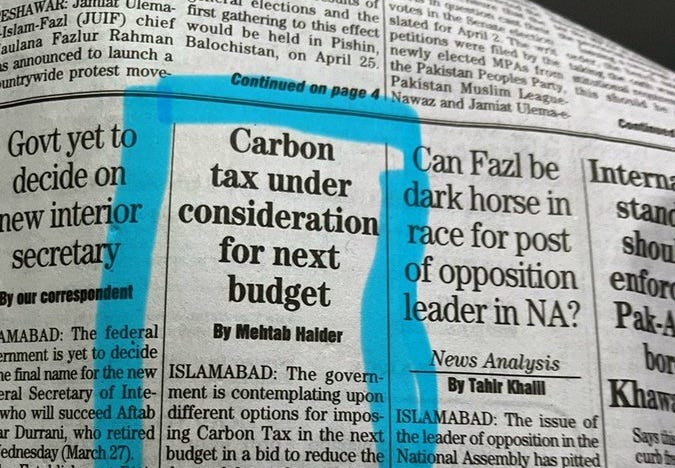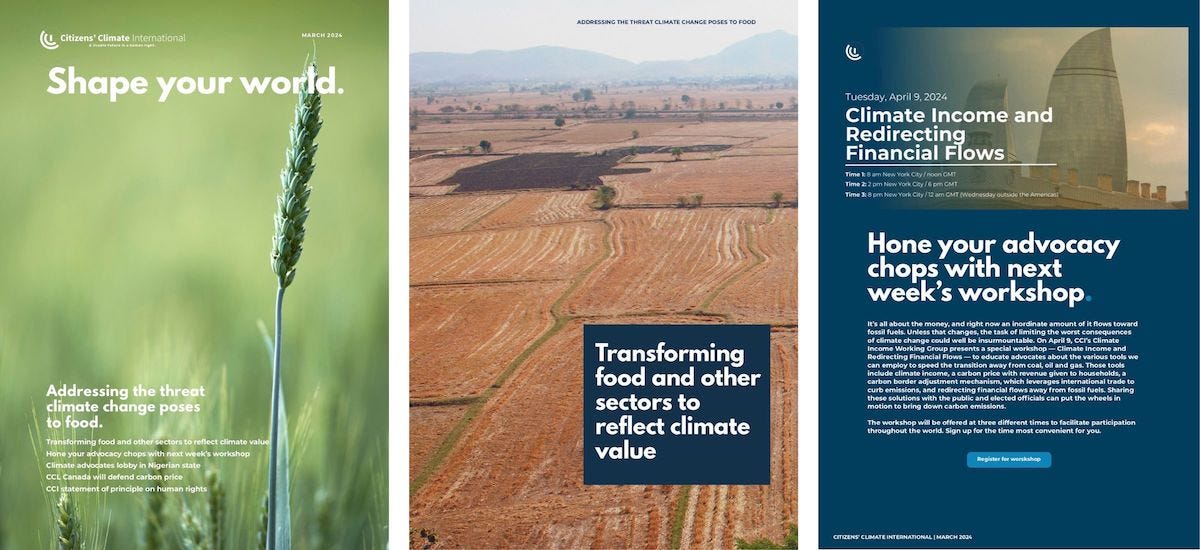Addressing the threat climate change poses to food
NEWSLETTER, March 2024—Transforming food and other sectors to reflect climate value; Workshop on Climate Income and Redirecting Financial Flows; Climate advocates lobby in Nigerian state.
This is supposed to be the rainy season in Africa, which farmers depend on to grow food for their families and communities. However, as the Associated Press reports, a drought in southern Africa that has persisted since last fall is endangering food supplies, putting millions of people in Zimbabwe, Zambia and Malawi at risk. As global temperatures continue to rise, climate change causes weather extremes — heat, drought, floods — that have a debilitating impact on our world’s ability to provide sufficient food. Mitigation measures, like reducing the heat-trapping emissions that increase temperatures, will certainly help, but we’ve reached the point where adaptation is needed to deal with weather extremes that threaten food security. Farmers throughout the world, particularly those in poorer nations, need help in transitioning to climate-smart agricultural practices, and Citizens’ Climate International is taking steps to assist in this effort. Without such help, food shortages will get worse, leading to instability and eventually conflict as people migrate en masse to more hospitable climates.
Transforming food and other sectors to reflect climate value
As climate change breaks down the world’s ability to feed people, it becomes increasingly clear that transformative change is needed in the ways we produce food and power our lives. Since the Paris Agreement was signed in 2016, it’s estimated that unsustainable food systems have cost the world more than $122 trillion. Yes, that’s trillion with a “T.” Getting the world on track to a sustainable future where all people thrive will require a new era of cooperation and innovation, where climate value is put at the heart of all financial decisions.
As the World Bank and International Monetary Fund meet this month in Washington, D.C., we must find ways to shift those decisions in the proper direction. Resources flowing to fossil fuels can be redirected toward climate-smart investments through the use of financial tools like climate income and carbon border adjustment mechanisms.
Changes in food systems to deal with the impact of climate change, improve sustainability and regenerate the soil will require major investments to help small farmers who supply much of the world’s food. To facilitate those investments, the Good Food Finance Facility will soon launch as a vehicle to gather and distribute funding and to collect and disseminate information to determine where investments will have the greatest impact.
In a new blog, CCI Executive Director Joe Robertson, shares his thoughts on how we can place climate value at the center of critical decisions that will be made in the near future.
Hone your advocacy chops with next week’s workshop
It’s all about the money, and right now an inordinate amount of it flows toward fossil fuels. Unless that changes, the task of limiting the worst consequences of climate change could well be insurmountable. On April 9, CCI’s Climate Income Working Group presents a special workshop — Climate Income and Redirecting Financial Flows — to educate advocates about the various tools we can employ to speed the transition away from coal, oil and gas. Those tools include climate income, a carbon price with revenue given to households, a carbon border adjustment mechanism, which leverages international trade to curb emissions, and redirecting financial flows away from fossil fuels. Sharing these solutions with the public and elected officials can put the wheels in motion to bring down carbon emissions. The workshop will be offered at three different times to facilitate participation throughout the world. Sign up for the time most convenient for you.
Climate advocates lobby in Nigerian state
Advocacy for effective climate policy is picking up steam in Nigeria, and Citizens’ Climate International is providing the fuel to generate that steam. Last month, CCI Africa Regional Coordinator David Michael Terungwa led a training for volunteers in the Nigerian state of Osan. The following day, they lobbied the state government for action to implement the National Climate Change Act. At the State House of Assembly, they met with the Honourable Folorunsho Yemi Ogundare, Chairman of the Committee on Environment and Sanitation, who told them, “If you present the draft climate change policy for the state today, I will initiate the bill tomorrow.”
Volunteers also lobbied at the Osun State Ministry of Environment, where they met with the Honourable Prince Mayowa Adejoorin. The request for a state climate change policy was well received. Both the state House of Assembly and the Ministry of Environment requested the support of the volunteers in drafting the policy.
Well done, CCI Nigeria!
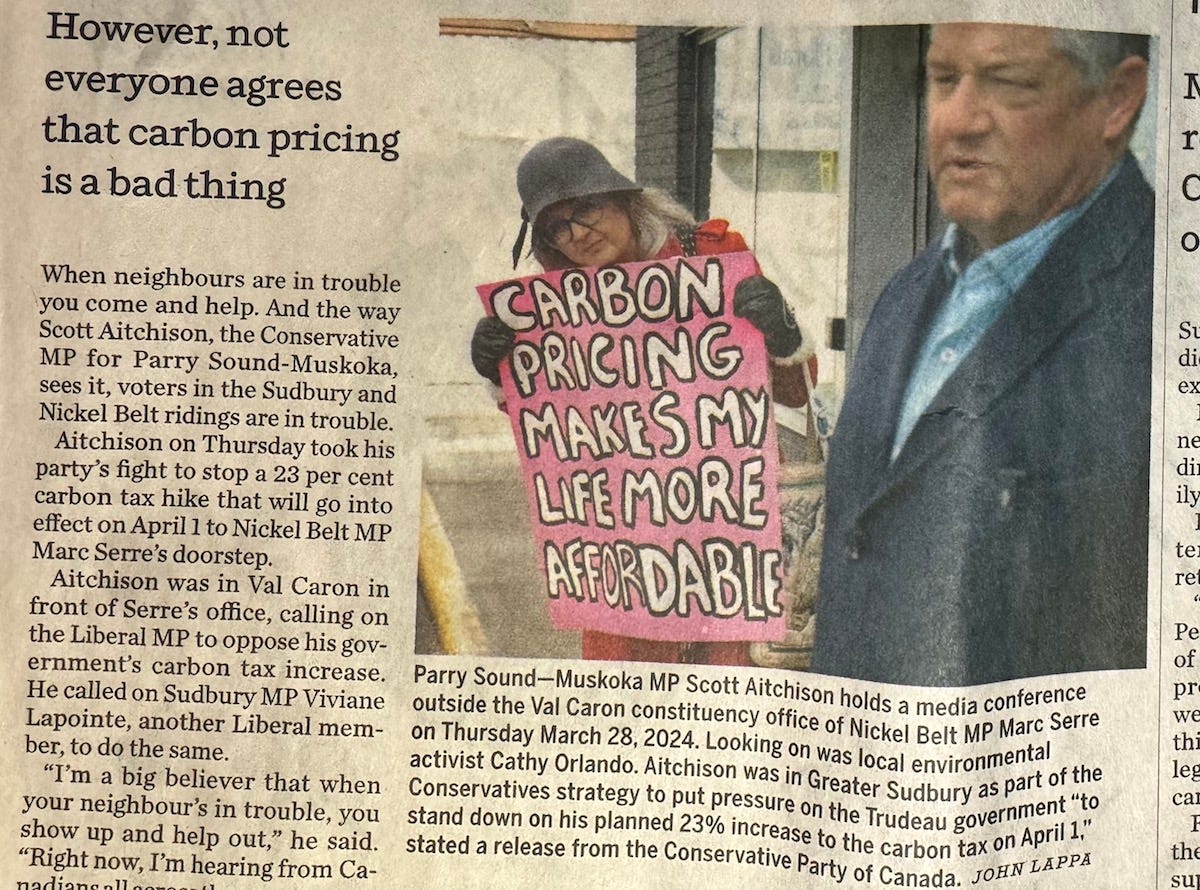
CCL Canada will defend carbon price
In 2010, CCL Canada started their campaign to put a national price on carbon with revenue sent to households. Their persistent and hard work finally paid off in 2018 when a federal carbon tax and rebate was enacted. Just before Prime Minister Justin Trudeau announced the new policy, Sen. Grant Mitchell told CCL Canada, “You are one of the most successful lobbying groups I have worked with, because you are about to get what you lobbied for.” The carbon fee, which will eventually rise to $170 per tonne by 2030, is now $80.
Despite the policy’s effectiveness at reducing emissions while protecting people economically, it has come under attack from politicians and the nation’s oil industry, and many fear what may happen if there is a change in government with next year’s election. This is why CCL Canada recently reaffirmed its commitment to carbon pricing and will work hard to defend it over the next year. They are currently urging Canadians to sign a parliamentary petition calling on members of the House of Commons to “renew their commitment to current Federal Carbon Tax legislation for the good of all Canadians.”
In a press release posted last week, CCL Canada said, “While alternatives exist, carbon pricing remains the most cost-effective means of reducing emissions and fostering green innovation. Abandoning carbon pricing would entail higher costs and fail to offer a comparable solution to combat climate change.”
Updates
Citizens’ Climate International is proud to welcome Myra L. Jackson (above) to our Governing Board. She was a founding member of the Advisory Council of the Citizens’ Climate Engagement Network back in 2015 and supported our Pathway to Paris work before that. More about Myra here.
Our group in South Sudan has met with government officials regarding the climate crisis, and the door has been opened to their group to continue meeting.
CCL France lobbied a climate policy specialist within one of their national political parties. In countries that have proportional representation it is key to meet with climate policy specialists within the political parties.
CCL Mexico is working with many NGOs to develop questions for candidates and raise public awareness of climate solutions leading up to the election in June.
CCL France, Citizens' Climate Europe and CCL Canada had a special meeting with a key multilateral institution in March regarding carbon border adjustment mechanisms. Because we operate under Chatham House Rules, we will not disclose the name of the institution. Suffice to say, key contacts were made and our institutional wisdom expanded significantly.
High school students from CCL Canada recently facilitated an EnROADS policy simulator workshop to other high school students at Science North, Canada's second largest science museum. Great work Sabitha, Salma, Sophia and Ahmed. Here is a video of them reciting a key conclusion from the Intergovernmental Panel on Climate Change. They were inspired by Alba Pena's work in Mexico bringing EnROADS workshops to youth. Additionally, Glady in Pickering, with the help of Doug in Beaches East York, gave an EnROADS and carbon pricing presentation to their local Municipal Retirees Organization Ontario group.
CCL Pakistan sent in a report that their government is considering carbon pricing in their next budget.
Coming up
The Climate Income and Redirecting Financial Flows Workshop: On Tuesday, April 9, Citizens' Climate International's newly formed Climate Income Working Group will host a workshop on climate income and redirecting financial flows. There are 3 convenient times to choose from. Register now.
Get-To-Know-Us: Join us to learn how you can help drive evidence-based and socially just climate action on one of three calls around Wednesday, April 17. In 2024, the agenda has been revamped to include an introduction to the EnROADS policy simulator and a primer on redirecting financial flows. Register here.
Dream No Small Dreams - CCL Canada's National Conference and Lobbying Days: If you live in Canada, make plans to join this event in Ottawa June 2-4. Registration opens in early March.
CCI statement of principle on human rights
Human rights are foundational, universal, and inalienable; no power has legitimate cause to dehumanize or degrade any person or class of people for any purpose. Climate policy is not a game; the stakes could not possibly be higher. The integrity and sustainability of food systems, economies, and even nation states, are at risk. We need everyone involved to be serious, forthright, and reliable.




